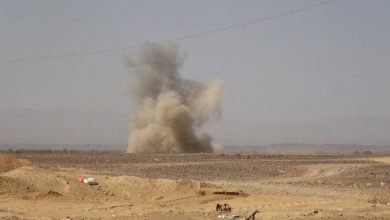US to blacklist Iranian official to Yemen

SMA NEWS – Yemen
The United States imposed terrorism sanctions on Iran’s envoy to the Houthis, describing Hasan Irlu’s recent dispatch to Yemen as a signal Tehran plans to increase its support to the Houthis and make it harder to resolve the five-year war in the Gulf state.
The US Treasury, confirming a Reuters report, described Irlu as an official of Iran’s elite Quds Force, the overseas arm of the Islamic Revolutionary Guard Corps and a central element in Tehran’s efforts to project its power in Yemen, Syria, and elsewhere in the Middle East.
The Treasury also imposed terrorism-related sanctions on Iran’s Al-Mustafa International University, which it said uses its branches around the world as a Quds Force recruitment platform for intelligence collection and operations.
It also blacklisted Yousef Ali Muraj, an Iran-based Pakistani citizen whom the Treasury accused of supporting Quds Force efforts to carry out operations in the Middle East and the United States.
Irlu, Muraj, and the university were all targeted under US Executive Order 13224, which allows Washington to block the assets of foreign individuals and entities that commit, or pose a significant risk of committing, acts of terrorism.
The decision to target Irlu, who was sent to Iran earlier this year to serve as Iran’s envoy to Yemen’s Houthi movement, appears in part a signal to the Houthis, who have been battling a Saudi-led military coalition in Yemen since 2015.
“Iran’s support for the Houthis fuels the conflict in Yemen and exacerbates the country’s instability,” US Secretary of State Mike Pompeo said in a statement. “By dispatching Irlu to Yemen, the (Quds Force) is signaling its intent to increase support to the Houthis and further complicate international efforts to reach a negotiated settlement to the conflict.”
The United Nations is trying to revive peace talks stalled since late 2018 to end a war that has been in a military deadlock for years, with the Houthis holding the capital, Sanaa, and most big urban centers.
Washington and Saudi Arabia see the Yemeni group as an extension of Iranian influence in the region. Two sources familiar with the matter told Reuters last month that US President Donald Trump’s administration, in an effort to support the Saudis, had threatened to blacklist the Houthi movement.
As a result of Tuesday’s action, all property of those designated, as well as any entities that are 50 percent or more owned by them, that fall under US jurisdiction are blocked, and US persons are generally prohibited from dealing with them.
In addition, foreign banks that knowingly facilitate significant transactions for them, or people who provide material support to them, risk losing access to the US financial system or having their own property blocked








